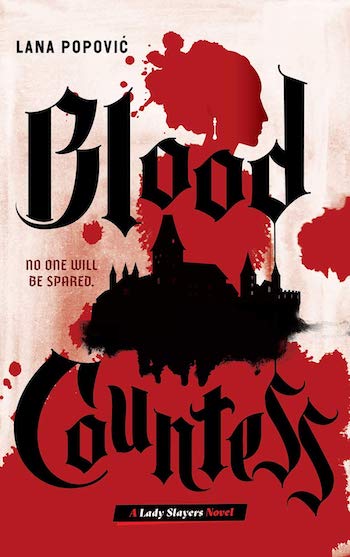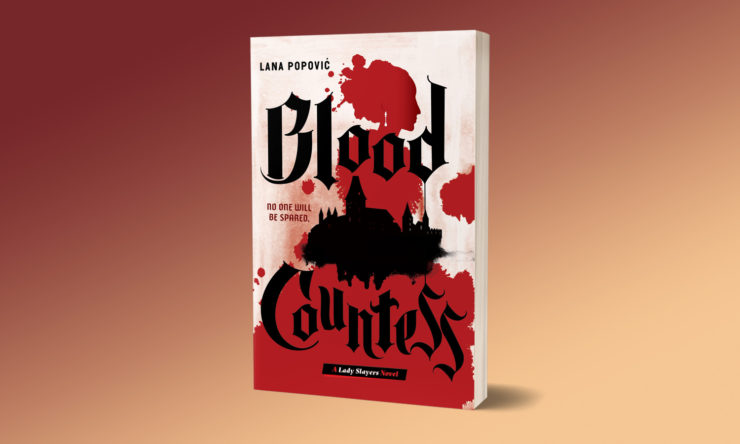At thirteen, Anna Darvulia stumbles into a chance street-meeting with the freshly wedded Countess Elizabeth Bathory during her wedding processional—and then at sixteen, she is summoned in her role as a town healer to attend to the countess’s illegitimate son. These two encounters, rife with tension and mutual interest, lead Anna to the imposing hulk of Nadasdy keep where she works first as a scullery maid, then as a companion and more. However, Elizabeth is not the woman she appears to be on the surface. Her violent tendencies begin to spill over into every aspect of their life together—but once Anna realizes she’s trapped, it’s far too late to escape, and she must save herself through other means.
Lana Popović herself was born in Serbia and lived in Hungary, Bulgaria, and Romania before moving to the US, where she studied psychology and literature at Yale University, law at Boston University, and publishing and writing at Emerson College. Her background shows through in the intriguing balance of social commentary, historical context, and outright sexy horror fiction that Blood Countess strikes for. Lesbian young adult fiction set in eastern Europe is already a bit of a rarity, let alone the scary kind.
I was at turns intrigued and bewildered by the choice to write the monstrous romance of Anna Darvulia and the infamous Elizabeth Bathory as a young adult novel—but ultimately pleased, because Popović handles her material well. God knows that as a queer teenager, I wanted to read stories that reflected the darkness I saw in the world. I wanted to have a safer space to process my more unpleasant or even disastrous desires, particularly when I read about things like the story of the Blood Countess. Popović treads a delicate balance between giving the reader the unfiltered horror of Elizabeth’s sadism, her violence, and her own victimization in a patriarchal social order… while also pulling the audience away, at the right moments, so as to not bury them in gore.
Buy the Book


Blood Countess
Which is not to say, however, that this book isn’t gory. It’s just that it’s exactly as graphic, in its sex and torture, as is appropriate in tone and vision to an older teen audience (and no more)—though I’m sure other folks will disagree with me there. Popović does not withdraw her lens from the ethical black hole that is Anna’s romantic and emotional entanglement with Elizabeth, even and especially when Anna realizes she’s come too far and ignored too much on the way to escape. It’s an abusive relationship, definitely. It’s also a powerful, haunting relationship, the kind that you might end up in with a very clever and very entertained psychopath, none the wiser of your precarious position until it’s too late.
That this relationship can be a lesbian relationship—as Anna is quite clear about her sole preference for women, while Elizabeth prefers men and women alike—without the horror being about lesbianism is good, too. If anything, the cultural dismissal of women’s erotic and romantic attachments is what allows Elizabeth to keep Anna as her lover despite her marriage, rather than their romantic attachment being a source of fear or secrecy itself. Furthermore, Elizabeth is a monster because of her monstrous behavior, not because she’s queer. Anna is a conflicted, desperate young woman not because of her queerness, but because of patriarchal control, economic class, and familial loyalties.
I’m reminded of the feeling I had about the first season of Hannibal: we’ve come far enough that we can have erotic, emotional queer horror without making monstrosity the fault of the queer love. And it is, let me emphasize, erotic. Elizabeth Bathory is terrifying, obsessional, and beautiful; their first sex scene, with the bathing, is breathless and scary (in large part because the reader knows what will come next, though Anna does not). While the point of view and prose style are distinctly young adult, the historical world does not treat these young women as teens—though they are, technically. Time ran differently then. And, had I picked up this book as a teenager today, I’d have loved it for giving me the truth of the matter unflinchingly.
Spoilers follow.
Class and gender solidarity (or failure thereof) underpin the story, too. Anna initially doesn’t believe her scullery-maid sisters when told tales of Elizabeth’s cruelty, because she desires and appreciates her. Then, once she’s elevated to her status as pet witch, she’s spurned by those girls but occupies a strange position in helping torment them only to save them from worse tortures. She’s willing to initially cut Elizabeth slack on her violence because she believes her to be acting out of rage learned at her abusive husband’s hands—but after Anna murders him, she has the horrible realization that he actually might have been tempering Elizabeth’s violence, not causing it. All along, she was a pawn, no safer than anyone else.
Overall, Blood Countess is quite straightforwardly a spooky haunted castle story full to the brim with murder, torture, and erotic control that’s nonetheless aware of the social and legal world underpinning and allowing such a history to exist. And because it is a historical, we also know precisely where it’s going from the start: the Countess found guilty of her crimes and bricked up in a tower to die. The ending happens a bit quicker than I expected, and is in fact rather abrupt, but once again, we knew where it would go. The fact that Elizabeth manages to exact a last piece of petty revenge—leaving half her fortune to her illegitimate son and half to Anna—strikes the final haunting toll of the novel, where Anna has survived but won’t ever have the liberty of forgetting what she allowed to occur and what she did with her own hands while living with the Countess.
The novel certainly maintained my interest through one long, fell swoop of a reading session. The realism of Anna’s terrifying situation is illustrated with luxurious descriptions of the haunting energies of Nadasdy Keep, her helpless fear in the face of impossible moral quandaries and failures to do the right thing (if there even is a right thing), and her settling cold shock at witnessing unspeakable violence over and over again. While the novel certainly teeters at the mature end of “young adult,” queer readers with an eye for horror and history will be well-pleased at its mingling of fright, desire, pain and love, particularly given its emotionally ambiguous ending.
Blood Countess is available from Amulet Books.
Lee Mandelo is a writer, critic, and editor whose primary fields of interest are speculative fiction and queer literature, especially when the two coincide. They have two books out, Beyond Binary: Genderqueer and Sexually Fluid Speculative Fiction and We Wuz Pushed: On Joanna Russ and Radical Truth-telling, and in the past have edited for publications like Strange Horizons Magazine. Other work has been featured in magazines such as Stone Telling, Clarkesworld, Apex, and Ideomancer.










